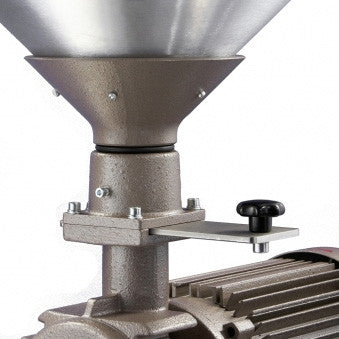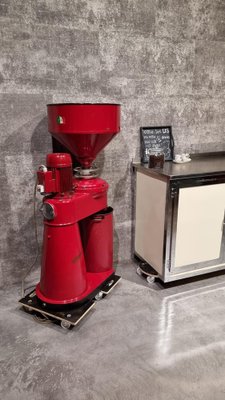Industrial Coffee Grinder: Pros, Disadvantages, and Features to Evaluate
Industrial Coffee Grinder: Pros, Disadvantages, and Features to Evaluate
Blog Article
Exactly How to Pick the Perfect Industrial Coffee Grinder for Your Company
Choosing the excellent industrial coffee grinder for your service is a diverse choice that requires careful consideration of a number of critical variables. In addition, understanding the different kinds of mills readily available can substantially affect your operational efficiency.
Assess Your Grinding Needs
When choosing an industrial coffee grinder, one must first examine their grinding demands to make certain optimum efficiency and consistency. This preliminary analysis entails recognizing the quantity of coffee to be refined daily, along with the preferred work size for different brewing methods. A high-capacity grinder might be needed for organizations offering big quantities of coffee, while smaller sized procedures may locate an extra compact model sufficient.
Additionally, it is vital to think about the kinds of coffee beans being used, as various beans might require details grinding strategies to accomplish the most effective flavor profile. Oily beans may necessitate a mill created to handle such features without clumping or overheating.
One more critical variable is the needed work consistency. Specialized coffee services typically require exact work dimensions to enhance removal and flavor, making it essential to choose a mill that can supply consistent results. Lastly, examining the available area and electrical demands will assist in picking a grinder that fits flawlessly into your functional workflow. By extensively evaluating these factors, services can make informed decisions that straighten with their coffee grinding requirements, inevitably resulting in a superior product and completely satisfied consumers.
Understand Grinder Types
Comprehending the different sorts of commercial coffee mills is crucial for making a notified choice that satisfies certain functional needs. There are primarily two groups of grinders: blade grinders and burr grinders.
Blade grinders use rotating blades to cut the coffee beans, resulting in an inconsistent grind size - Industrial Coffee Grinder. While they might be more inexpensive, they are commonly not suitable for commercial applications where accuracy is essential
On the various other hand, burr mills provide an extra consistent work by squashing the beans in between 2 surface areas. They can be more categorized into flat burr and cone-shaped burr mills. Flat burr grinders offer a consistent work dimension and are commonly preferred for espresso preparation, while conelike burr mills are flexible and can deal with a range of brew approaches, from espresso to French press.
When selecting a mill, take into consideration the certain needs of your business, consisting of preferred grind uniformity, production volume, and the kinds of coffee beverages you plan to supply - Industrial Coffee Grinder. Each grinder type has its benefits and restrictions, so recognizing these subtleties enables informed decision-making that lines up with functional objectives
Evaluate Grind Dimension Consistency
Attaining grind dimension consistency is vital for producing high-quality coffee, as variants in particle size can significantly affect extraction and taste. When selecting a commercial coffee grinder, it is vital to examine how well the maker maintains harmony in work size throughout various batches. Irregular grind sizes can bring about unequal removal, resulting in a mug that might taste weak or extremely bitter.
To evaluate work size consistency, take into consideration mills with features such as adjustable work setups and top notch burrs. Burr grinders, specifically, master creating consistent particle sizes contrasted to blade grinders. The product and form of the burrs play a crucial role, with stainless-steel and ceramic alternatives offering sturdiness and accuracy.

Consider Production Capability
In the hectic globe of coffee manufacturing, considering production capacity is critical for companies aiming to meet my company demand without sacrificing quality. The production capacity of a commercial coffee mill straight influences a business's ability to satisfy orders efficiently, manage supply, and react to rising and fall market trends.
When assessing manufacturing ability, it is important to review the mill's outcome rate, typically determined in pounds per hour. This dimension ought to straighten with your company's projected sales quantity and growth targets. As an example, a coffee shop with a high turnover might call for a grinder that can process numerous hundred pounds daily, while a smaller procedure may suffice with a reduced capability model.
Additionally, consider the sort of coffee being processed. Various beans and blends may influence grinding speed and efficiency, demanding a grinder with the ability of handling varied manufacturing requirements. It's additionally worth considering the mill's ability to keep consistent top quality under high output problems, as any changes can influence the end product.
Ultimately, picking a grinder that matches your service's manufacturing capacity will certainly guarantee you remain responsive and affordable to consumer expectations.

Budget and Upkeep Factors
When examining the right commercial coffee grinder, budget and maintenance aspects play a substantial role in the total decision-making procedure,. A first investment in a high-grade grinder can yield long-term benefits, however it's vital to develop a clear spending plan that aligns with your business's functional demands. Take into consideration both the acquisition rate and this website possible functional prices, such as power intake and substitute components.
Industrial coffee mills need routine upkeep to ensure optimal performance and long life. Review the supplier's referrals for upkeep, including cleaning schedules and parts substitute, as these will certainly impact long-lasting operational expenses.

Purchasing a mill that is sturdy yet simple to maintain can conserve money with time. While lower-priced options might be alluring, they may try this web-site sustain higher upkeep prices and lowered effectiveness. Eventually, balancing first prices with long-term upkeep and operational efficiency will certainly direct you to the best option for your company's coffee grinding demands.
Conclusion
Selecting the optimal industrial coffee grinder requires a detailed evaluation of grinding requirements, grinder kinds, grind size uniformity, production ability, and financial considerations. An appropriate grinder not just enhances the high quality of the coffee created however likewise contributes to the overall success and profitability of the enterprise.
Specialty coffee services commonly require exact work dimensions to boost extraction and flavor, making it crucial to select a grinder that can supply consistent results. Flat burr mills use a consistent work dimension and are commonly preferred for espresso prep work, while cone-shaped burr grinders are versatile and can manage a range of mixture techniques, from espresso to French press.
When picking a commercial coffee grinder, it is crucial to review exactly how well the equipment keeps uniformity in work size throughout different sets. Burr mills, in particular, excel in producing consistent particle dimensions compared to blade mills.Selecting the ideal commercial coffee mill requires an extensive assessment of grinding demands, grinder kinds, grind size uniformity, production capacity, and financial considerations.
Report this page